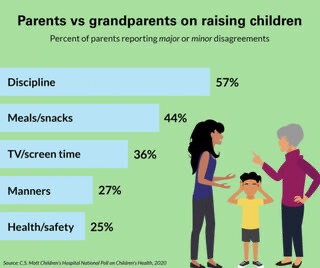Grandparents are special people in the lives of today's grandchildren. Because of longevity, many of today's grandchildren even have great grandparents. “Research shows that as many as 9 out of 10 adult grandchildren feel their grandparents influenced their values and behaviors. Grandparents transmit to their grandchildren the values and norms of social order,” according to Dr. Karl Pillemer of Cornell University.

Source: C.S. Mott Children's Hospital, Used with permission.
Disagreement on How to Raise Children
The parent-grandparent relationship in 2020 is not all smooth sailing. Several issues are causing friction. The biggest issue stems from disagreements over how to raise children. Have you ever had a disagreement with your parents (the grandparents) on how to raise your children? Major and minor disagreements with grandparents' parenting choices occur frequently according to a 2020 C.S. Mott Children’s Hospital National Poll on Children’s Health:
"Most parents (89%) report that their child sees at least one grandparent often or occasionally. Among these parents, 6% report major disagreements and 37% minor disagreements with one or more grandparents about their parenting choices. Fifteen percent of parents say that disagreements have a negative effect on their child’s relationship with grandparents.”
Results from the C.S. Mott Children's Hospital National Poll
- "Four in ten parents (43%) have asked a grandparent to change their behavior to be consistent with the parent’s choices or rules."
- "In response to such a request, 47% of parents report the grandparent changed their behavior; 36% say the grandparent agreed to the request but did not change their behavior, and 17% say the grandparent refused the request to change."
- "Among parents who say grandparents changed their behavior, only 4% report major disagreements."
- "In comparison, among parents who say grandparents agreed to change but did not change their behavior, 15% report major disagreements; when grandparents refused to change, 25% of parents report major disagreements."
- "Overall, 15% of parents limit the amount of time their child sees some grandparents. These limitations are more common when grandparents do not respect parenting choices:"
- "32% of parents limit the amount of time children see grandparents who agreed to but did not change their behavior."
- "and 42% limit the amount of time children see grandparents who refused to change."
- "In comparison, among parents who did not ask a grandparent to change their behavior, only 6% limit the amount of time their child sees grandparents."
- "Forty percent of parents say disagreements occur because grandparents are too soft on the child, while 14% say grandparents are too tough; 46% say disagreements arise from both." (Clark, Freed, Singer, Gebremariam & Schultz, 2020)
Grandparents and Overindulgence
Grandparents love their grandchildren and they want their grandchildren to love them. At times grandparents go a bit too far. They give grandchildren too much. They do too much for them. They don't follow parents' rules. They are too soft, too tough, or both. In short, many grandparents overindulge their grandchildren. As a result, parents limit the amount of time their child sees their grandparents.

Source: Andrea Piacquadio/Pexels/License CO0
Do grandparents have a right to overindulge their grandchildren?
I often hear grandparents say:
“She’s my favorite grandchild. I have a right to spoil her if I want to! I don’t see a problem with that!”
“Why shouldn’t I give my grandchild everything he wants? I have the money to do it, and besides, I enjoy it and he likes it!”
"What’s the harm in overindulging my grandchild?”
There is harm!
Here are a few of the risks that grandchildren face as a result of being overindulged.
As adults:
- They grow up believing they are the center of the universe.
- They develop disrespectful attitudes.
- They become helpless as a result of not knowing the skills they need to function as adults.
- They grow up with an overblown sense of entitlement.
- They become irresponsible, feel ungrateful, and unhappy.
Grandparents Who Do Not Follow Parenting Decisions
Grandparents who refuse to respect parenting choices may pay a big price: limits on the amount of time they spend with their grandchildren.
- "32% of parents limit the amount of time children see grandparents who agreed to but did not change their behavior."
- "42% limit the amount of time children see grandparents who refused to change."
- "among parents who did not ask a grandparent to change their behavior, only 6% limit the amount of time their child sees grandparents." (Clark, Freed, Singer, Gebremariam & Schultz, 2020)

Source: Bredehoft
Parents are worried about childhood overindulgence. They may also feel that grandparents are undercutting their parental authority when they do not respect and follow their parenting choices. It is imperative that parents and grandparents have frank conversations about parental expectations, and that grandparents need to understand and comply with parent requests or risk losing special time with their grandchildren.
Practice Aloha. Do all things with Love, Grace, and Gratitude
© 2020 David J. Bredehoft
References
Clark, S. J., Freed, G. L., Singer, D. C., Gebremariam, A., & Schultz, S. (2020, August 17). When parents and grandparents disagree. 36(5), 1-2. C. S. Mott Children's Hospital National Poll on Children's Health.
Bredehoft, D. J., Mennicke, S. A., Potter, A. M., & Clarke, J. I. (1998). Perceptions attributed by adults to parental overindulgence during childhood. Journal of Family and Consumer Sciences Education. 16(2), 3-17.


